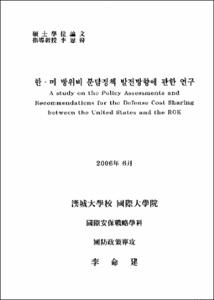한·미 방위비 분담정책 발전방향에 관한 연구
- Files in This Item:
-
-
Download
 000000557030.pdf
기타 데이터 / 3.36 MB / Adobe PDF
000000557030.pdf
기타 데이터 / 3.36 MB / Adobe PDF
-
Items in Repository are protected by copyright, with all rights reserved, unless otherwise indicated.
 000000557030.pdf
기타 데이터 / 3.36 MB / Adobe PDF
000000557030.pdf
기타 데이터 / 3.36 MB / Adobe PDFItems in Repository are protected by copyright, with all rights reserved, unless otherwise indicated.